Why Putin thinks he's winning in the war against Ukraine
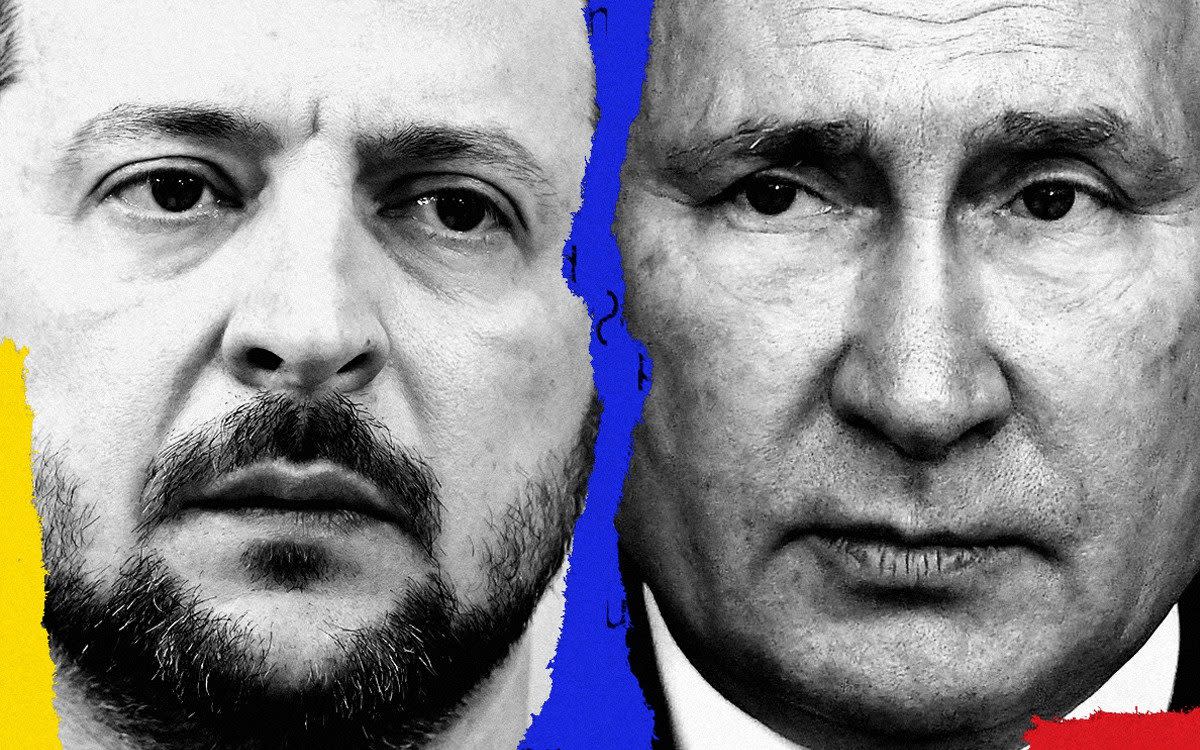
Vladimir Putin says more than 600,000 Russian soldiers are in Ukraine, almost twice the number he started the war with. His “freeloading” adversary will soon run out of Western support. And in a sign of his growing confidence at his traditional end-of-year press conference, he insists that Ukraine’s forces have “failed everywhere” in their counter-offensive. But as the snow starts to fill trenches at the end of a second year of fighting he initially expected to be over in days, is he right?
Fading optimism
It is certainly true that summer optimism around Ukraine’s ability to retake land down to the coast by Christmas wilted as autumn turned to winter. Now burnt-out equipment, some Western donated, slowly rusts in sleet splashed red with blood.
But that blood is Russian too. Kyiv’s forces continue to repel waves of morally repugnant “meat assaults” from Putin’s troops: ill-equipped Russian men running terrified and occasionally drunk at Ukrainian guns. Even as the ground freezes such attacks continue. The MoD today revealed that a newly formed Russian paratroop division “suffered exceptionally heavy losses” when it tried to dislodge Ukrainian forces from the left bank of the Dnipro river. The MoD said the 104th Guards Airborne Division (104 GAD) was “poorly supported by airpower and artillery, while many of the troops were highly likely inexperienced”. Russian bloggers demanded the officer in command resign.
That’s the kind of criticism that Putin likes to pretend does not exist, and which forced him to cancel last year’s press conference. Even today’s press conference was not immune to domestic barbs aimed at him – with critical questions from the public mistakenly displayed behind him on the big screen including: “I’d like to know, when will our president pay attention to his own country? We’ve got no education, no healthcare. The abyss lies ahead...” Mr Putin may like to present Ukraine’s backers as divided and Russia united, but – as he apologised for the price of eggs in his own country – the conflict is certainly not all going his own way.
The failed counter-attack
Ukraine’s counter-offensive culminated in November. Culmination is a military term essentially meaning a force is exhausted, either physically or in terms of logistics expended. It needs a pause, a regroup, a replenishment.
To culminate is not to be defeated – it doesn’t follow that just because a force cannot keep going forwards it will automatically be pushed back. Rather, culmination is a routine and expected phase of any military advance. The trick for military commanders is to anticipate when it will occur and plan accordingly, so that the last objective is taken and secured against enemy counter-attack just as the force has to pause.
Kyiv will have taken many lessons about planning, force integration and training from the counter-offensive, but in geographic terms the advance has not reached any of the major objectives it was likely designed to: Tokmak, Melitopol, perhaps even, although this would always have been a bit ambitious, the Sea of Azov.
There’s no denying Ukraine wished for more from the counter-offensive on land, but those saying the culmination of this operation shows Ukraine’s effort is finished and President Zelensky might as well just take his chances with negotiations are very wrong. War doesn’t work like that. Look at Dunkirk. Or, look at the failed raid in 1942 on the port of Dieppe. Canadian-led Operation Jubilee, the first large offensive in Europe after Dunkirk, was criticised as having been launched out of a desire just to “do something”. The operation was a disaster with over half the force killed, wounded or captured, but the experience there did influence the success of D-Day two years later. Lessons such as prioritising the landing on wide open beaches to allow space for large numbers of troops and vehicles to be offloaded quickly and to develop vehicles (known as “Hobart’s Funnies” after the ingenious Major-General Percy Hobart) specifically to breach the fortifications of the Atlantic Wall, led Lord Mountbatten, an architect of the raid, to claim “the battle of D-Day was won on the beaches of Dieppe”.
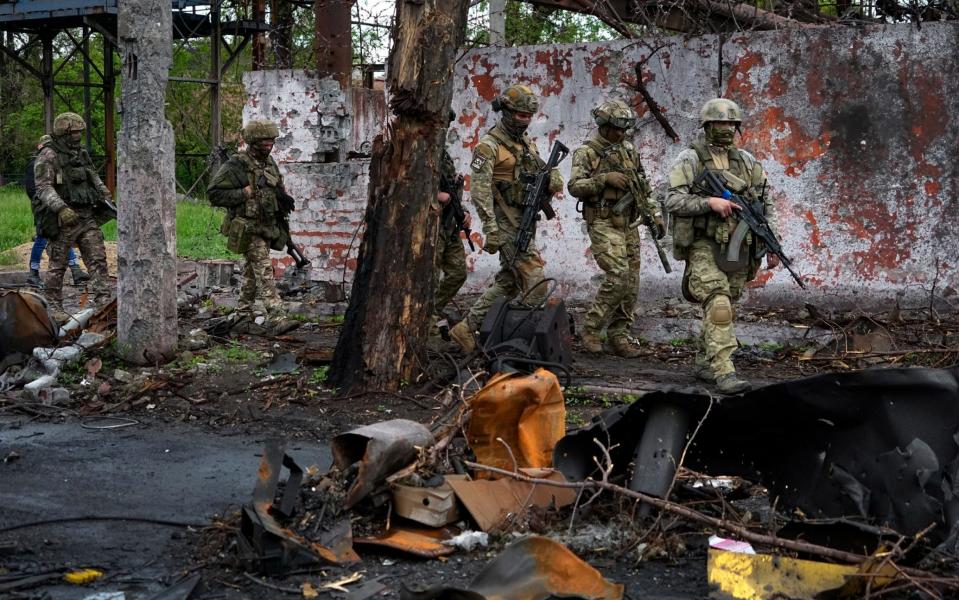
Take another famous battle: Operation Market Garden, immortalised in the film A Bridge Too Far, was the effort in September 1944 to push across the Lower Rhine river to create an invasion route into northern Germany. Lessons from that operation – to drop paratroopers in a single lift instead of numerous waves over a number of hours and only a short distance behind enemy lines to make the link-up with ground forces all the swifter – directly fed into the conduct of Operation Varsity six months later, the successful airborne effort that did get over the Rhine.
The military lesson here is that even a well-planned, well-equipped and well-led operation can fail, or at least not meet all of its objectives, and should from time to time in war be expected to, but if the correct analysis is applied - which could result in reorganisation and even the removal of senior leaders – lessons will be learnt that should lead to more successful operations in the future.
Undoubtedly though, Ukraine ends 2023 in a precarious position on the battlefield. Defence analyst Konrad Muzyka says Russia is slowly regaining the initiative following the culmination of Ukraine’s counter-offensive.
“The tables may have turned for the foreseeable future,” he says. “It’s incredibly important for Ukraine now to start building their own fortifications, as deep as they possibly can.”
Ukraine’s priority now should be thinking about a “theory of victory”.
“How would they like to end this war? Is getting Crimea back still on the table? Or just retaking territory Russia captured since February last year? The political leadership needs to articulate that one way or another.”
Stasis on land, triumph at sea
With both sides dug in, the war in Ukraine is entering a phase of what General Valery Zaluzhny, the head of Ukraine’s armed forces, referred to recently in an essay, as “positional warfare”, i.e. largely static. This is opposed to manoeuvre warfare, when lines can shift rapidly and dramatically, and which we witnessed last year when Ukraine broke through Russian lines near Kharkiv and dashed eastwards for about 50 miles, or when Moscow pulled its troops back from Kheron and across the Dnipro river.
Positional doesn’t mean stalemate, however; Gen Zaluzhny chose his words carefully.
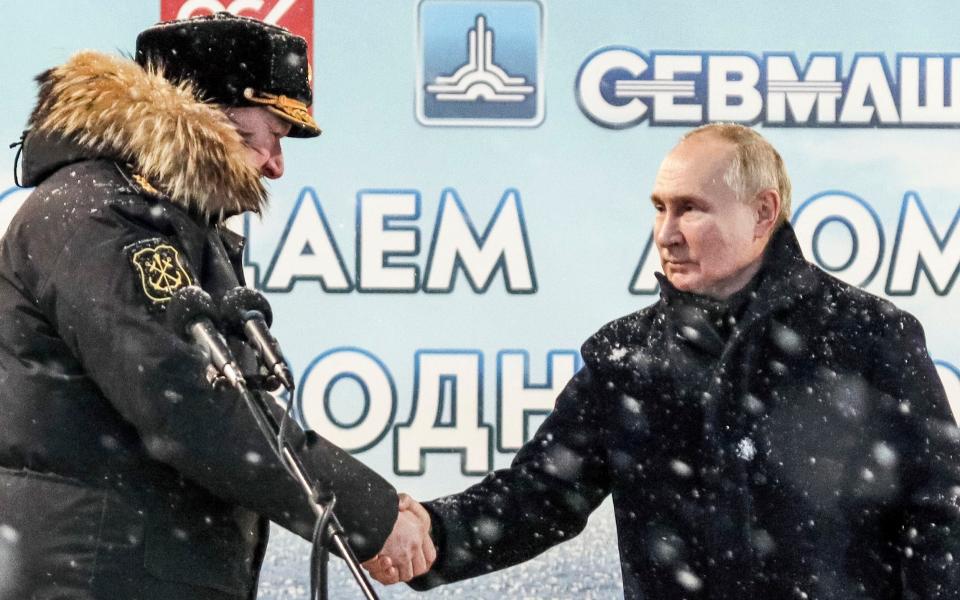
Even if the land campaign hasn’t seen any major breakthroughs, the overall direction of the war – which is, of course, the ability of one country to impose its will on another through military means – is governed by many more factors.
Look, for example, at the Black Sea. The risk of being hit by long-range missiles such as Britain’s Storm Shadow or the French equivalent, SCALP, means the Russian fleet has been forced to move many assets – including, it is thought, its entire fleet of Kilo-class diesel electric submarines – out of Sevastopol. The headquarters of Moscow’s Black Sea Fleet was also destroyed a few weeks ago in a strike that reportedly killed its commander, Admiral Viktor Sokolov.
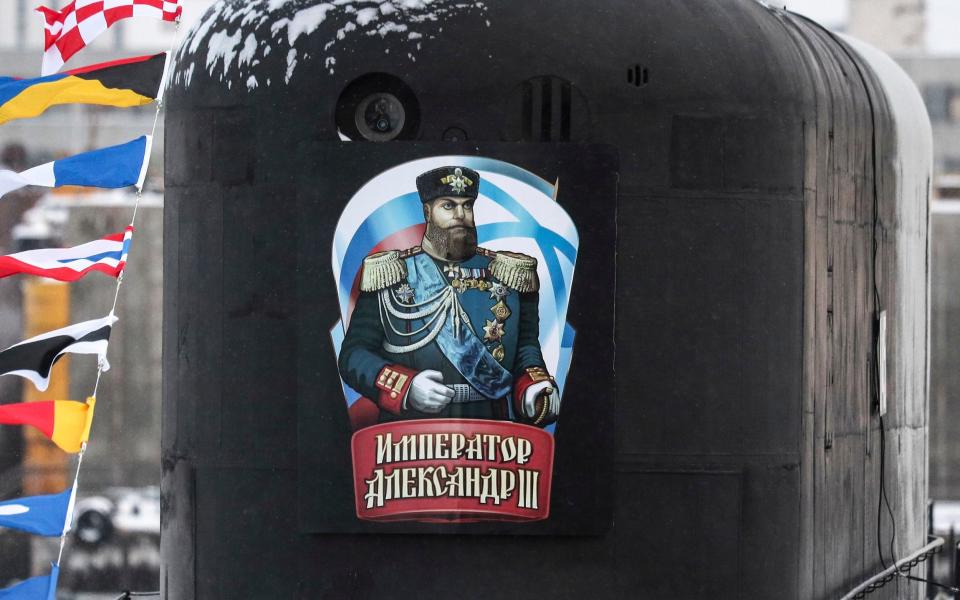
Russian naval assets have been shown to be incredibly vulnerable away from port, too. Ukraine’s modified Neptune missiles and naval drones have proven adept at hitting ships at sea. The consequent reduction in the number of Russian vessels deployed that are capable of firing Kalibr cruise missiles into Odessa and other ports has enabled Ukraine to revive its international trade in grain, a vital economic lifeline. Russia’s de facto blockade of Ukrainian ports on the sea and the Danube river has been broken; an astonishing result for a country without a navy.
Stalemate and wavering allies
Prof Timothy Snyder, Levin Professor of History and Global Affairs at Yale University, takes issue with the very notion of “stalemate”. “I hate and despise, with my entire being, the metaphor of ‘stalemate’,” he says. “War is not a game of chess.”
He says the word allows us to move away from the “grimy, difficult truths” about war. It is also a false reference, he adds, noting that “in a war, I can give you five more kings. Britain, the US or the EU could say, ‘Okay, we’re going to give you a lot of counter-battery [artillery]. Or instead of giving you 20 Bradley (a US-made infantry fighting vehicle) we’re going to give you 300.’ Rules don’t actually exist.”
At this stage of the war, Prof Snyder says Russia doesn’t have meaningful offensive potential, a situation that will endure if Ukraine’s international partners continue to send arms.
“In a long war the economic advantage the Ukrainians indirectly have should eventually be telling,” he says, pointing out that even if US support was withdrawn the combined economic heft of the EU and Britain substantially outmatches Russia.
He is not the only one to highlight the potential economic and industrial advantage Ukraine could enjoy, if the resolve of partner nations endures. Although, “right now, that’s a pretty big ‘if’,” he cautions.
At the Lucerne Dialogue, held in Switzerland each November, Sir Richard Barrons, a retired British general, said: “The only way Ukraine wins is if we mobilise our industry and our will behind that.”
Addressing business and political leaders he criticised the lacklustre efforts to ramp up European defence industrial production: “Do not tell me it’s unaffordable, because you represent an economy of 15 trillion euros a year and I can feed the Ukrainian army on about 75 billion euros for two or three years and I can make them win,” he said. “This is not about affordability, this is about choice.”
Similar warnings have been sounded in a new paper for the Royal United Services Institute.
Professor Justin Bronk, senior research fellow for Airpower and Technology, says Russia’s economy is now on a war footing, with armament production rising sharply.
“The Kremlin’s strategy is to conquer Ukraine by continuing to fight until the West gives up, so forcing Kyiv to ‘negotiate’ won’t end the war, it will only encourage Russia to fight on.”
Another push?
When will Ukraine attempt another push? That depends on a number of things.
First, the combatants have to get through winter. Once that descends in earnest on the battlefields it will largely snuff out all but the most determined movement. The trenches will still be inhabited, of course, but troops freeze easily when standing still just keeping watch for the enemy.
Morale can dip just as quickly as the temperature. Kyiv’s troops, in better winter gear and with a legitimate cause to fight for, should be expected to weather such conditions in better order than the Russians.
It will still be brutal, however. Exposed fingers can freeze to the barrel of a frozen rifle, injuring the owner of the arm that tries to rip them off. Feet, the critical enabler for infantry, must be protected against trench foot in the wet weather and frost bite in the cold. Poor quality clothing, especially boots (or LPCs - Leather Personnel Carriers, as the British Army’s gallows humour had it) will create as many casualties as the enemy.
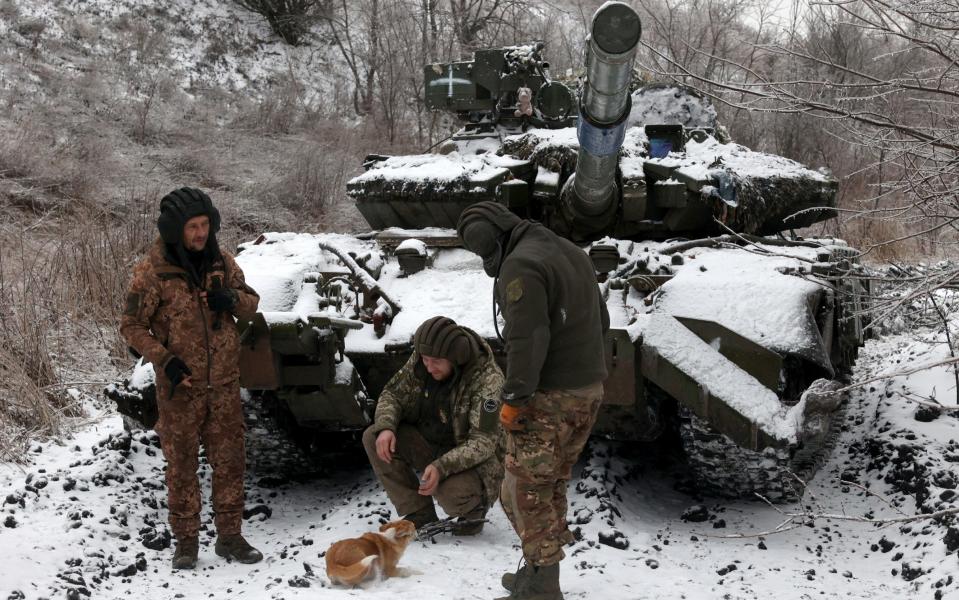
Second, Ukraine may well decide a number of failed small offensives conducted in quick succession – to shore up domestic and international support – could be more damaging than waiting until they have a much bigger and more capable force.
Kyiv may take the view that 2024 is not a year to attempt bold advances on the battlefield, but as a time to build. To amass stocks of armaments, train military forces in more than just the most basic infantry tactics, and to develop a deep and resilient defence industrial base.
The return of Trump
If Kyiv’s international partners truly believe that the fight in Ukraine benefits all who believe in the international rules-based order, they will also be required to dig in – figuratively, in terms of political support, and literally, by building new factories to win the attritional war of resources.
That may make military sense, but there’s a problem: time, and it’s probably not on Ukraine’s side.
Giorgia Meloni, the Italian prime minister, was caught out recently on a prank call saying: “I see that there is a lot of fatigue… from all sides”. This speaks of the risk of “compassion fatigue” and raises questions of how easily the international community can be convinced that setbacks in war are to be expected and not signs of a losing strategy.
Time is also ticking away to next November’s US presidential election.
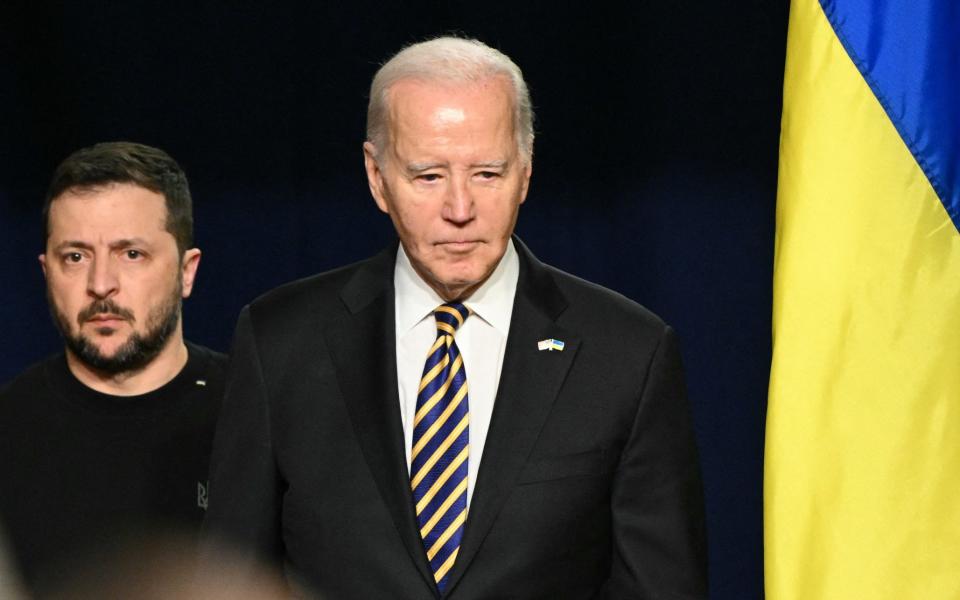
There is no guarantee Donald Trump will win the Republican Party’s nomination – although that is looking increasingly likely given the polling figures – or that he could beat Joe Biden (the chances of the Democrats ditching the current President as their nominee are vanishingly small).
Given the war in Ukraine, a belligerent China, Iran and North Korea and challenges to the rules-based international order from Venezuela (that might be about to start a war in South America) and Turkey (evading international sanctions to trade with Russia) a possible second Trump presidency could be even more consequential for the world than the first.
Which Trump might return to the White House? A vindictive geopolitical amateur, in thrall to the “Big Man” theory of history and more interested in using his power to settle domestic scores, or a statesman able to take difficult decisions? He did, after all, authorise the strike that killed Qasem Soleimani, head of Iran’s Quds Force and the man responsible for Tehran’s extraterritorial and clandestine military operations.
Russian dissent
There is much hard work ahead for President Zelensky to ensure the right lessons are learned from the recent counter-offensive and to reinforce morale, outside the country as much as within. His priority for 2024 will likely be to convince Ukraine’s international partners to take long-term political, military and industrial positions, regardless of any “fatigue” and ahead, potentially, of a distracted or disinterested White House.
Western officials note Putin has geared his economy for war at the expense of other domestic considerations. Russia’s defence spending in 2024 will be higher than health and education combined and demands for fighters at the front mean there are personnel shortages back home. This is unsustainable and will have domestic repercussions.
There is no political opposition in Russia to speak of, but there are signs of dissent.
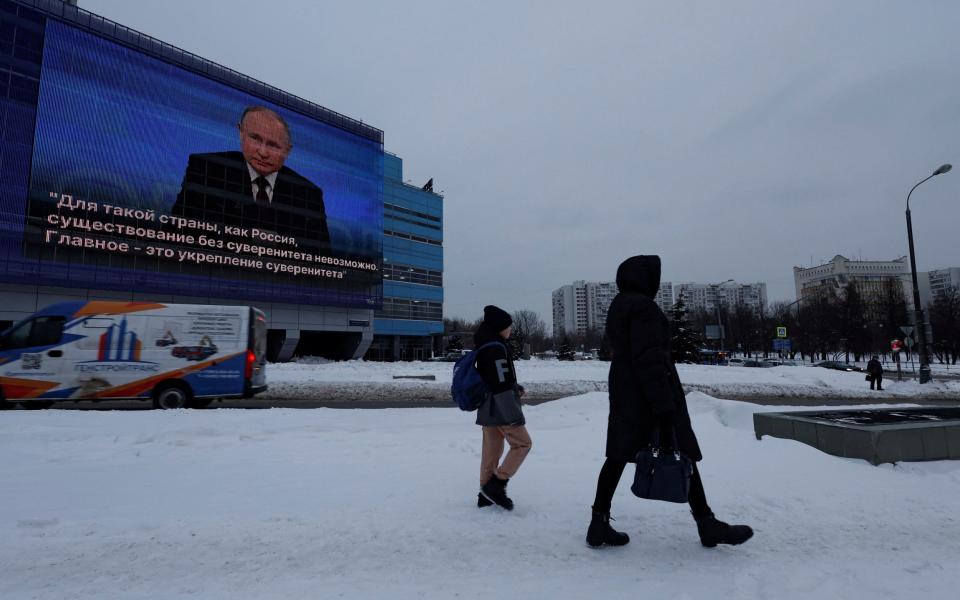
Evgenia Kara-Murza, a human rights activist and wife of political prisoner Vladimir Kara-Murza, says the level of repression inside Russia shows Putin’s regime, although strong, is “totally paranoid”.
Mrs Kara-Murza, whose husband was sentenced in April 2023 to 25 years in prison, says: “I understand the fear and why the regime is using such repressive mechanisms against dissenters. They want to intimidate some and silence others.
“If there was no dissent in the country the regime would not be using such atrocious mechanisms of repression.
“The regime is going so cruelly after dissenters in Russia because it wants to annihilate that alternative that does exist in the country. It wants also to show the world a warped image of reality in which the entire Russian population stands strongly supporting Vladimir Putin and the war in Ukraine. This has nothing to do with reality. The voices of those who run impossible risks to say ‘no’ to the regime need to be heard.”
Overcoming distractions
Lord Cameron now says that defeating Russian aggression is “the challenge of this generation” while retired Gen Sir Mark Carleton-Smith, the former head of the British Army, told the Telegraph that the international community “needs to continue to hold its nerve and to sustain this commitment to Ukraine”.
Hamas’s attack on Israel sucked some of the oxygen and the attention of events in Europe, he suggests. “Where one reads that there might be a growing sense that, given the events of the summer, Ukraine is going to find it very difficult to defeat Russia militarily, one might reflect that that’s possibly of our own making at the moment. Because incrementalism is no way to fight a war.”
Prof Bronk, of Rusi, frames this challenge through the context of a potential war in the Pacific: “The extent of China’s military capability advances mean that the US military is increasingly overstretched in the Indo-Pacific,” he says.
“In the event of a flashpoint conflict or even serious standoff later in the 2020s, the US will not have sufficient capacity concurrently to reinforce Europe at scale.
“Russia will have a strong incentive to use any US-China clash in the late 2020s to trigger Article 5 by attacking a small area of Nato territory while the US cannot respond, unless Europe urgently invests in rearmament.”
The institutions and norms of international behaviour, built over the last few decades from the carnage of the Second World War, are under strain as never before. The so-called “rules-based international order” has no divine right to exist and others, notably China and Russia, are happy to pull at loose threads; to offer an alternative model for the 21st century.
Baulk at confronting these challenges and the message will be sent far and wide that the values the West says it cares about so much aren’t actually that important. The consequences could be severe.
A Western official says support for Ukraine “is not conditional on any battlefield breakthrough”. But Putin’s bluster in Moscow suggests he knows different. This winter will begin to determine who has more right to feel confident.


